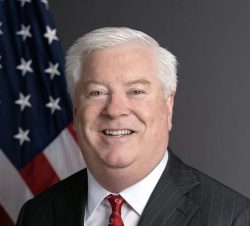16:06 JST, February 17, 2021
Twenty years ago, at the outset of the 21st century, George W. Bush was inaugurated as U.S. president, the Sept. 11 terrorist attacks were still more than half a year away, and there were people who remained optimistic that the post-Cold War international community would join hands to create one world.
At the time, China was carrying out economic reforms under the leadership of Premier Zhu Rongji, known as “China’s Gorbachev” after the last leader of the Soviet Union, Mikhail Gorbachev. It was in 2001 that China formally joined the World Trade Organization, beginning to pave its way to becoming a real economic power.
With the passing of 20 years, the optimistic and friendly attitude toward China in the rest of the world has also gone.
The world currently is headed toward an era of division. In the past two decades, civil wars and terrorist attacks have raged across the world. The Lehman shock-induced financial crisis rattled the stability of politics in democracies, a development that, exacerbated by growing economic inequality, has led to the rise of populism.
While in office, former U.S. President Donald Trump built walls along the U.S.-Mexico border. British Prime Minister Boris Johnson set a “barrier” along the English Channel through Brexit, Britain’s withdrawal from the European Union. The dynamics of their policies were opposite to the vector of integration brought about by globalization.
Division is not affecting the international community alone. Division within democracies is serious, too, as seen during the latest U.S. presidential election and in the Brexit referendum in Britain.
New U.S. President Joe Biden, therefore, is seeking to restore unity between the United States and other democracies as one of the agenda items of utmost importance for his administration. While campaigning, he said that, if elected, he would convene a global summit of democracies.
Nevertheless, although such a gathering can offer an opportunity for leaders to speak of lofty political ideas, Biden on his own is quite unlikely to end division and restore unity in the international community and at home.
Meanwhile, Johnson, in his capacity as the chair of the Group of Seven in 2021, intends to turn the G7 summit scheduled for June into a “D10” summit by inviting the leaders of three other democracies: India, Australia and South Korea.
Both the United States and Britain appear to be looking for measures to contain the division that has so far deepened. As such, what is going on in today’s world is the commingling of the dynamics of fanning division and the dynamics of strengthening unity.
The United States and other democracies are in ideological rivalry with authoritarian countries, such as China and Russia, creating another division in the world. The tensions between the United States and China are the most dire and serious of these.
In its “Freedom in the World 2020” report, U.S. nongovernmental organization Freedom House said, “2019 was the 14th consecutive year of decline in global freedom.” On the other hand, China has been quick to control the novel coronavirus pandemic on its own soil and resume economic activity. As a result, think tanks have now forecast that China will overtake the United States as the world’s largest economy in terms of nominal gross domestic product in 2028, much earlier than previously predicted.
Is an authoritarian system, which conducts stringent control and surveillance of people, really a better governance model in today’s world? Or, is a democratic system still feasibly the best political system?
As I ask myself these questions, I strongly feel that 2021 is likely to become a watershed moment in history.
This year, the Chinese Communist Party marks the centenary of its foundation. Its leadership, while looking back at how China became a unified country, may resort to the use of force against opponents inside and outside China with greater ease than before. If this is the case, the most worrisome focal points are the possibility that a military clash may break out over Taiwan, the Pratas Islands in the South China Sea and the Senkaku Islands of Okinawa Prefecture.
We have to stay on the alert especially for a situation in which China, trying to expand its sphere of influence, may have an accidental “incident” erupt and take advantage of it to begin the use of force without hesitation. In this case, China is likely to choose unrelenting measures without heeding international opinion.
This could be a repeat of the Manchurian Incident staged by the Kwantung Army of Japan in September 1931. Ironically enough, we cannot rule out the risk that a similar event may be triggered by the China Coast Guard and the People’s Liberation Army Navy in the East and South China Seas. Amid global economic difficulties and political turmoil, China may try to attain its political goal with strong military actions without formally declaring war.
Should China now carry out what Japan did in China 90 years ago, it would be taking revenge on history indeed. The League of Nations, the predecessor of the United Nations, was unable to take any initiative to settle the confrontation between Japan and China because its member states were fiercely at odds over what should be done about Japan’s military operations in Manchuria. Today, China can exercise its veto power in the U.N. Security Council as one of the five permanent members. This will certainly make it difficult for the United Nations to impose sanctions on China for using force.
Why have the situations in the areas mentioned above become so tense? Importantly, the situation in the Taiwan Strait has been tense for more than a century. When thinking about the current crisis, it would be meaningful to trace the relevant geopolitical history.
The Taiwan Strait became one of the battle zones in the Sino-Japanese War of 1894-1895. Shortly after the middle of the 20th century, a standoff began between U.S. forces and the Chinese military across the strait. The Taiwan Strait thus has always emerged as a front line as well as a scene of international tension in each of the confrontations between maritime and continental nations.
A rapid change in the balance of power tends to greatly impede peace and stability in areas like the Taiwan Strait. Late in the 19th century, the decline of the Qing dynasty of China and the military rise of Japan resulted in heightened tensions and a war in and around the strait. In the decades following the end of World War II, the establishment of the People’s Republic of China and the increase in China’s influence across Asia have brought about a crisis in the Taiwan Strait.
From the Japanese standpoint, the more critical development is the heightening of tensions over the Senkaku Islands in the East China Sea. If the leadership of China concludes that Japan’s national power is in decline and the influence of the United States in the region around the islands is waning, there will be a significantly increased possibility that China may try to alter the status quo in the area surrounding the Senkakus.
China wants to establish its superiority in the whole of the East China Sea and is likely to shift the balance of power in the region greatly in its favor if it establishes de facto control over the Senkakus by taking advantage of an accidental incident. Any attempt to change the status quo in the region without declaring war — which would amount to a “repeat of the Manchurian Incident” — must not be allowed.
The administration of Prime Minister Yoshihide Suga has an important task to head off China’s move to “break the status quo” and prevent an armed clash from occurring. Conflicts tend to be more prone to erupt when countries are troubled by social woes such as economic turmoil or the spread of anxiety over an infectious disease. The Japanese government should carry out policies toward China with this reality in mind.

Yuichi Hosoya
Hosoya is a professor of international politics at Keio University and the author of numerous books on British, European and Japanese politics and foreign affairs.
Top Articles in Editorial & Columns
-

Riku-Ryu Pair Wins Gold Medal: Their Strong Bond Leads to Major Comeback Victory
-

40 Million Foreign Visitors to Japan: Urgent Measures Should Be Implemented to Tackle Overtourism
-

China Provoked Takaichi into Risky Move of Dissolving House of Representatives, But It’s a Gamble She Just Might Win
-

University of Tokyo Professor Arrested: Serious Lack of Ethical Sense, Failure of Institutional Governance
-

Policy Measures on Foreign Nationals: How Should Stricter Regulations and Coexistence Be Balanced?
JN ACCESS RANKING
-

Japan PM Takaichi’s Cabinet Resigns en Masse
-

Japan Institute to Use Domestic Commercial Optical Lattice Clock to Set Japan Standard Time
-

Israeli Ambassador to Japan Speaks about Japan’s Role in the Reconstruction of Gaza
-

Man Infected with Measles Reportedly Dined at Restaurant in Tokyo Station
-

Videos Plagiarized, Reposted with False Subtitles Claiming ‘Ryukyu Belongs to China’; Anti-China False Information Also Posted in Japan
























